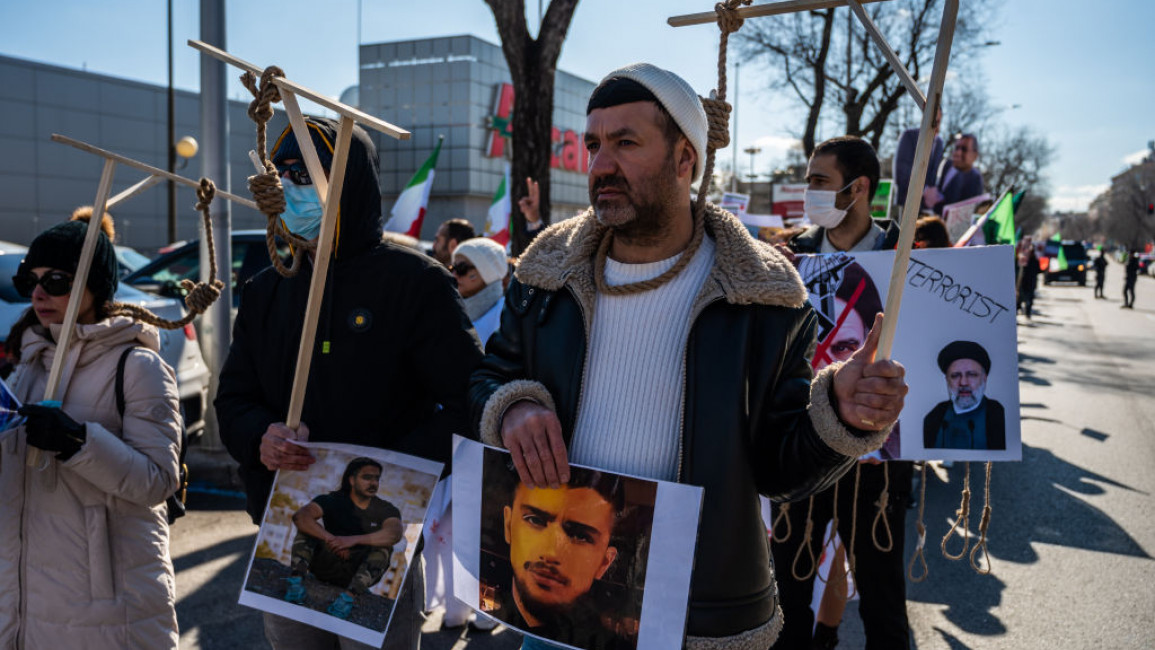One person is hanged almost every six hours in Iran
Since late April, the pace of executions in Iran has dramatically increased, and between 25 April and 13 May, the establishment sent at least 75 prisoners to the gallows, putting the average number of death penalties carried out in this period at an alarming number of one execution at about every six hours.
An examination into the cases of executions by The New Arab showed that on 13 May alone, nine prisoners were hung in Kerman, Mashhad and Khoram Abad for drug-related offences.
10 May was another brutal day of executions in Iran, with ten men executed in different cities nationwide. Before dawn that day, three convicted of crimes related to drug trafficking were hung in the Ghezel Hesar prison in Karaj, a city about 50 kilometres to the west of the capital Tehran. Also on that same day in the same city, four other men found guilty in a rape case were executed in Rajaee Shahr prison.
Two men accused of drug trafficking in Arak central prison and one man convicted of homicide in the Dizel Abad prison in the Kurdish city of Kermanshah were other inmates who did not see the sunrise on 10 May.
The trend continued for the second week of May. Iran, after China, has the highest number of executions in the world.
On Tuesday, 8 May, four men were executed in Shiraz and Semnana. On Monday, three men were hung in Isfahan, Dezful and Zahedan. On Saturday, the death penalty was carried out to punish four men in the cities of Salmas and Zanjan.
Another four men's life ended by the hanging rope on 5 May in Urumieh central prison.
According to TNA analysis of data published in the reports about the executions, at least five out of ten men executed on 10 May were from the Baluch religious and ethnic minority living in the eastern province of Sistan-o Baluchistan.
The Norwey-based Iran Human Rights organisation first raised the alarm about the increasing number of executions in Iran on 5 May.
In a report, Iran Human Rights declared that during the ten days before 5 May, 42 prisoners – 22 from the Baluch minority – were hung in Iranian prisons.
The rights group warned that executions were used as a means to spread fear among the people and demanded that the international community react responsibly to the rising number of executions in Iran.
"The main purpose for these executions is to intimidate the society, not to fight the crimes," said the director of this human rights organisation, Mohammad Amiri-Moghadam.
A 2022 report about the number of executions in Iran demonstrated that the Baluch minorities made up 30 per cent of all executions last year, while this minority group represents only about six per cent of the country's population.
The Baluch people, predominantly following the Sunni branch of Islam, have been under unprecedented pressure since last September when Iran was engulfed with anti-establishment demonstrations.
At least 128 people were killed in Iran's Sistan-o-Baluchistan province during the protests which have been held after the Friday prayers in this region.
On 5 May, during the Friday prayer sermon, Molavi Abdolhamid, the most respected Sunni leader in Iran from the Baluch community, strongly criticised the establishment for the execution of the Baluch people.
"Which government kills its own people? How can you trust those who kill their own people?" he said during the sermon.
"What have you done for the people in Sistan-o Baluchistan that now you execute them? … the only art [you] have is the execution," added Abdolhamid, referring to widespread poverty in Sistan-o Baluchistan, Iran's most impoverished province.
After the 5 May sermon, the prayers demonstrated in the city of Zahedan chanting: "down with the execution republic", denouncing the high number of hangings in the first week of May.
Fariba Baluch, a human rights activist from this region, in a December 2022 interview, told TNA that the establishment used execution for drug-related crimes in this province to systematically suppress a minority group which demands its basic rights.
Meanwhile, the Iran Human Rights Organization warned on 12 May that the Iranian authorities set up more executions in mid-May, saying that 22 people, including six women, were notified of their imminent executions in two prisons in Isfahan.
"The accelerating trend of executions continues in Iran, and if the international community doesn't take serious steps to stop the Islamic Republic's killing machine, hundreds will be its victims in the coming months," said Amiry-Moghaddam, the rights organisations' director.



